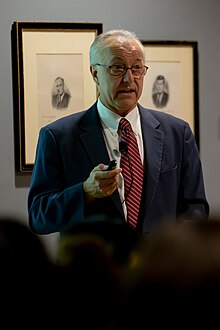
Leukemia is a group of blood cancers that usually begin in the bone marrow and produce high numbers of abnormal blood cells. These blood cells are not fully developed and are called blasts or leukemia cells. Symptoms may include bleeding and bruising, bone pain, fatigue, fever, and an increased risk of infections. These symptoms occur due to a lack of normal blood cells. Diagnosis is typically made by blood tests or bone marrow biopsy.
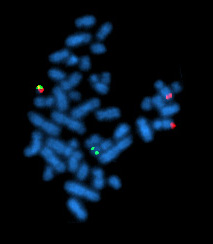
The Philadelphia chromosome or Philadelphia translocation (Ph) is a specific genetic abnormality in chromosome 22 of leukemia cancer cells. This chromosome is defective and unusually short because of reciprocal translocation, t(9;22)(q34;q11), of genetic material between chromosome 9 and chromosome 22, and contains a fusion gene called BCR-ABL1. This gene is the ABL1 gene of chromosome 9 juxtaposed onto the breakpoint cluster region BCR gene of chromosome 22, coding for a hybrid protein: a tyrosine kinase signaling protein that is "always on", causing the cell to divide uncontrollably by interrupting the stability of the genome and impairing various signaling pathways governing the cell cycle.

Chronic myelogenous leukemia (CML), also known as chronic myeloid leukemia, is a cancer of the white blood cells. It is a form of leukemia characterized by the increased and unregulated growth of myeloid cells in the bone marrow and the accumulation of these cells in the blood. CML is a clonal bone marrow stem cell disorder in which a proliferation of mature granulocytes and their precursors is found; characteristic increase in basophils is clinically relevant. It is a type of myeloproliferative neoplasm associated with a characteristic chromosomal translocation called the Philadelphia chromosome.

Imatinib, sold under the brand names Gleevec and Glivec (both marketed worldwide by Novartis) among others, is an oral targeted therapy medication used to treat cancer. Imatinib is a small molecule inhibitor targeting multiple tyrosine kinases such as CSF1R, ABL, c-KIT, FLT3, and PDGFR-β. Specifically, it is used for chronic myelogenous leukemia (CML) and acute lymphocytic leukemia (ALL) that are Philadelphia chromosome–positive (Ph+), certain types of gastrointestinal stromal tumors (GIST), hypereosinophilic syndrome (HES), chronic eosinophilic leukemia (CEL), systemic mastocytosis, and myelodysplastic syndrome.

Sidney Farber was an American pediatric pathologist. He is regarded as the father of modern chemotherapy for his work using folic acid antagonists to combat leukemia, which led to the development of other chemotherapeutic agents against other malignancies. Farber was also active in cancer research advocacy and fundraising, most notably through his establishment of the Jimmy Fund, a foundation dedicated to pediatric research in childhood cancers. The Dana–Farber Cancer Institute is named after him.
Dana-Farber Cancer Institute (DFCI) is a comprehensive cancer treatment and research center in Boston, Massachusetts. Dana-Farber is the founding member of the Dana-Farber/Harvard Cancer Center, Harvard's Comprehensive Cancer Center designated by the National Cancer Institute, and one of the 15 clinical affiliates and research institutes of Harvard Medical School.

Emil "Tom" Frei III was an American physician and oncologist. He was the former director and former physician-in-chief of the Dana–Farber Cancer Institute in Boston, Massachusetts. He was also the Richard and Susan Smith Distinguished Professor of Medicine at Harvard Medical School.
Lawrence S.B. Goldstein is a professor of cellular and molecular medicine at University of California, San Diego and investigator with the Howard Hughes Medical Institute. He receives grant funding from the NIH, the Johns Hopkins ALS Center, the HighQ Foundation, and the California Institute for Regenerative Medicine. In 2020 he was elected to the National Academy of Sciences.

Shinya Yamanaka is a Japanese stem cell researcher and a Nobel Prize laureate. He is a professor and the director emeritus of Center for iPS Cell Research and Application, Kyoto University; as a senior investigator at the UCSF-affiliated Gladstone Institutes in San Francisco, California; and as a professor of anatomy at University of California, San Francisco (UCSF). Yamanaka is also a past president of the International Society for Stem Cell Research (ISSCR).

Brian J. Druker is a physician-scientist at Oregon Health & Science University (OHSU), in Portland, Oregon. He is the director of OHSU's Knight Cancer Institute, JELD-WEN Chair of Leukemia Research, Associate Dean for Oncology in the OHSU School of Medicine, and professor of medicine.
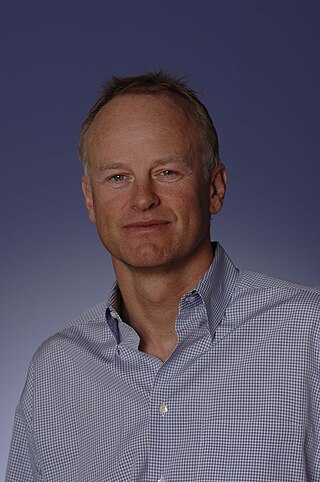
Nicholas B. Lydon FRS is a British scientist and entrepreneur. In 2009, he was awarded the Lasker Clinical Award and in 2012 the Japan Prize for the development of Gleevec, also known as Imatinib, a selective BCR-ABL inhibitor for the treatment of chronic myeloid leukaemia (CML), which converted a fatal cancer into a manageable chronic condition.
Leonard I. Zon, M.D., is the Grousbeck Professor of Pediatric Medicine at Harvard Medical School, Investigator at Howard Hughes Medical Institute, and Director of the Stem Cell Program, Children’s Hospital Boston.
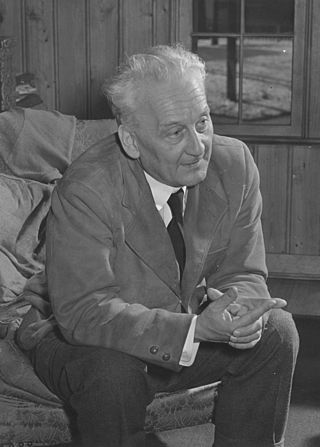
The Szent-Györgyi Prize for Progress in Cancer Research, established by National Foundation for Cancer Research (NFCR) and named in honor of Albert Szent-Györgyi, Nobel laureate and co-founder of NFCR, has been awarded annually since 2006 to outstanding researchers whose scientific achievements have expanded the understanding of cancer and whose vision has moved cancer research in new directions. The Szent-Györgyi Prize honors researchers whose discoveries have made possible new approaches to preventing, diagnosing and/or treating cancer. The Prize recipient is honored at a formal dinner and award ceremony and receives a $25,000 cash prize. In addition, the recipient leads the next "Szent-Györgyi Prize Committee" as honorary chairman.
The International Society for Stem Cell Research (ISSCR) is an independent 501(c)(3) nonprofit organization based in Evanston, Illinois, United States. The organization's mission is to promote excellence in stem cell science and applications to human health.
Owen Witte is an American physician-scientist at the University of California, Los Angeles. He is a University Professor of microbiology, immunology and molecular genetics in the David Geffen School of Medicine at UCLA, founding director emeritus of the UCLA Eli and Edythe Broad Center of Regenerative Medicine and Stem Cell Research, and the UC Regents’ David Saxon Presidential Chair in developmental immunology (1989–present). Witte is also a Howard Hughes Medical Institute investigator (1986–2016) and a member of the President's Cancer Panel, the National Academy of Sciences, the National Academy of Medicine, the American Academy of Arts and Sciences, and the Cancer Research Academy of the AACR. He serves on numerous editorial boards and scientific advisory boards for academic centers and biotechnology companies.
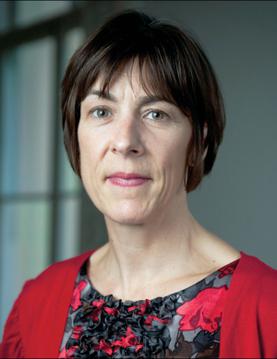
Tessa Laurie Holyoake, was a Scottish haematology-oncology physician. She specialised in chronic myeloid leukaemia (CML), and discovered its stem cell. She was considered a world leading expert in leukaemia research.

Nirali N. Shah is an American physician-scientist and pediatric hematologist-oncologist, serving as head of the hematologic malignancies section of the pediatric oncology branch at the National Cancer Institute. She researches the translation of immunotherapeutic approaches to treat high-risk hematologic malignancies in children, adolescents and young adults.
Scott Allen Armstrong is an American pediatric oncologist and cancer biologist focused on chromatin-based control of gene expression in cancer and therapeutic discovery. Armstrong and his team were the first to isolate rare leukemia stem cells in a mouse model of leukemia.
Franziska Michor is an Austrian computational biologist. She is a professor in the department of data science at the Dana–Farber Cancer Institute. She serves as Director of the Physical Sciences-Oncology Center and the Center for Cancer Evolution.
Nissim Benvenisty is Professor of Genetics, the Herbert Cohn Chair in Cancer Research and the Director of “The Azrieli Center for Stem Cells and Genetic Research” at the Alexander Silberman Institute of Life Sciences, Hebrew University.
